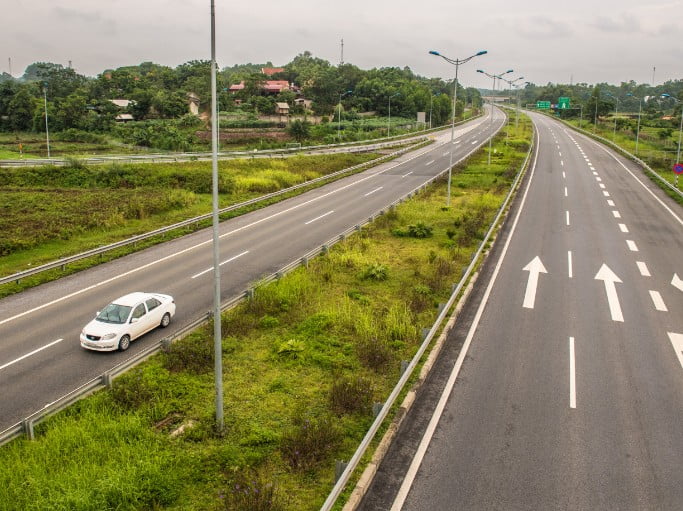What's new?
Transport
Transport lies at the heart of GMS cooperation. The development of physical infrastructure complemented with policies and procedures for crossing borders and developing trade along key routes have been central to efforts to forge a truly interconnected subregion.
Environment
Natural ecosystems – and the food, water, energy, and other vital elements they provide – lie at the heart of the development of the GMS. How these natural resources are protected, managed, and enhanced will determine the long-term sustainability of its environment and economic development.
Energy
New energy solutions are crucial to developing the GMS, where power demand is surging. These include improving energy efficiency and cross-border power trading.
Urban Development
By 2050, GMS is expected to be at least 50% urbanized. Careful planning is needed to balance urban growth with environmental protection and economic equity so that healthy cities can be enjoyed by all residents.
Trade & Transport Facilitation
The GMS Transport and Trade Facilitation Action Program is working to overcome existing barriers in order to link the subregion to the ASEAN Economic Community’s single market and production base, as well as other regional cooperation initiatives.
Health Cooperation
Regional integration creates opportunities to draw on the subregion’s health leadership, human resource skills, and programming experience to address common health challenges.
Tourism
Countries in the GMS are working together to promote the subregion as a single destination for international visitors and encourage communities to enhance the environmental, social, and economic benefits of tourism.
Latest Publications
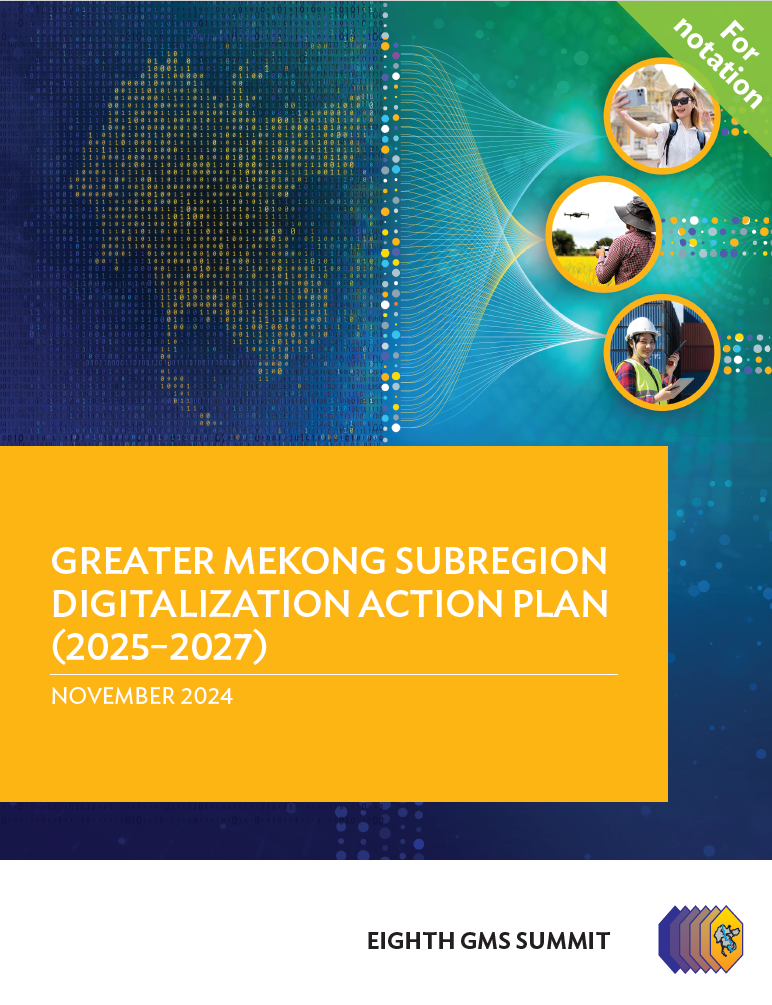
GMS Digitalization Action Plan (2025–2027)
This was developed based on the Scoping Study on Digitalization in the GMS, presented for notation in the 26th GMS Ministerial Conference, and a complement to the GMS Digital Economy Cooperation Initiative, which was developed and proposed by the People’s Republic of China and endorsed by the 25th GMS Ministerial Conference.
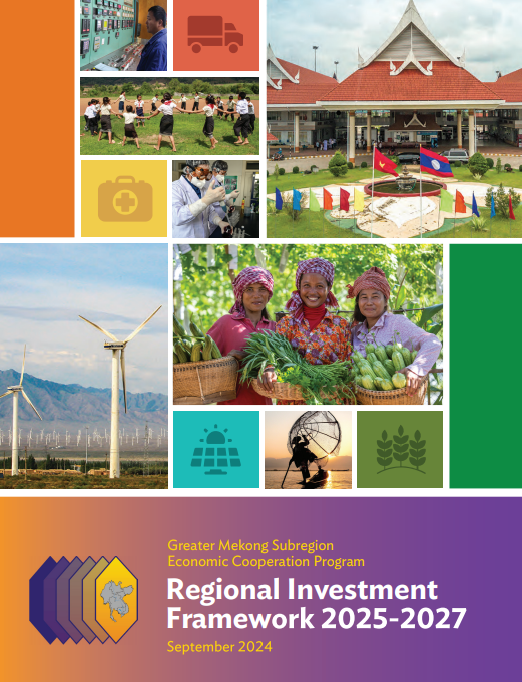
Regional Investment Framework 2025-2027
The Greater Mekong Subregion (GMS) Regional Investment Framework 2025–2027 (RIF 2027) is the subsequent 3-year rolling pipeline of projects of the GMS Program. It is comprised of 176 projects across the countries and sectors of the GMS program.

GMS Digitalization Action Plan (2025–2027)
This was developed based on the Scoping Study on Digitalization in the GMS, presented for notation in the 26th GMS Ministerial Conference, and a complement to the GMS Digital Economy Cooperation Initiative, which was developed and proposed by the People’s Republic of China and endorsed by the 25th GMS Ministerial Conference.
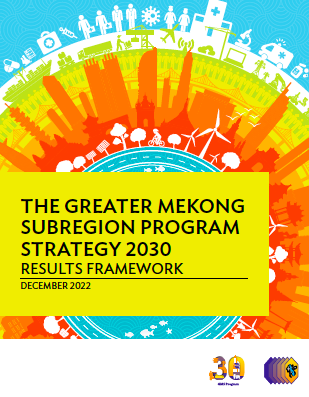
The Greater Mekong Subregion Program Strategy 2030: Results Framework
The GMS Secretariat, in close coordination with GMS countries, will prepare a results framework to trace the implementation of GMS-2030...

Report to the Leaders on Recent Achievements and Directions of GMS Cooperation
This document outlines the achievements of the GMS Program since the 7th GMS Summit. This report has three parts: I – The Work and Accomplishments of the GMS Program Since the Last Summit; II – The Various Deliverables for the 8th GMS Summit; and III – The Proposed Future Directions for the GMS Program.
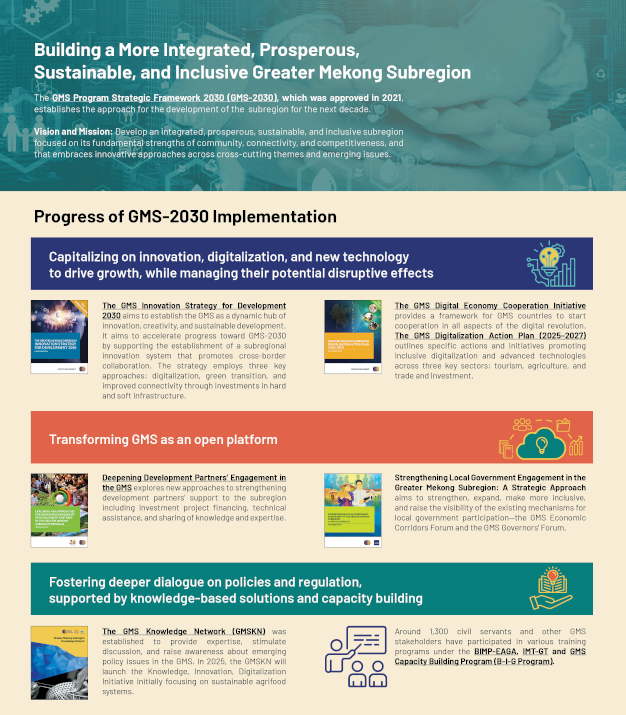
Greater Mekong Subregion Infographics 2024
The latest GMS infographic gives a snapshot of progress in implementing the GMS Economic Cooperation Program Strategic Framework (GMS-2030).
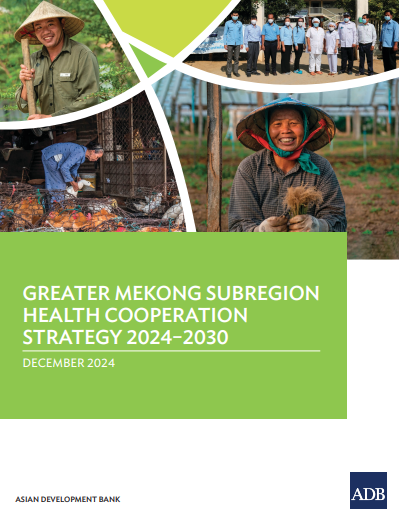
GMS Regional Health Cooperation Strategy 2024-2030
The GMS Health Cooperation Strategy 2024-2030 builds upon the previous 2019-2023 strategy and two decades of development partner support, including the Asian Development Bank.
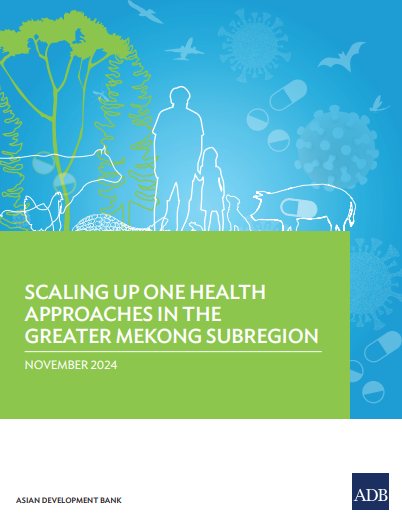
Scaling Up One Health Approaches in the Greater Mekong Subregion
The publication addresses the use of wildlife, underlines the need to ramp up action against diseases such as rabies, and shows why countries should build up their animal health capacities.
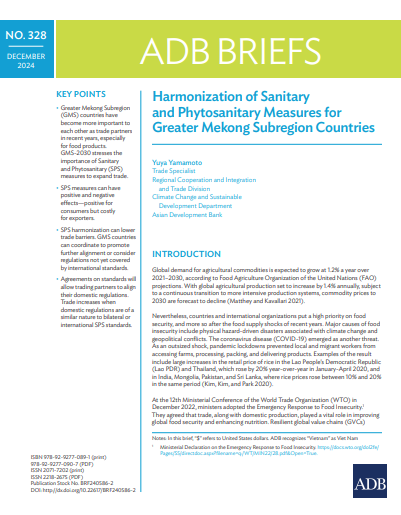
Harmonization of Sanitary and Phytosanitary Measures for Greater Mekong Subregion Countries
Pointing to rising trade between GMS countries and explaining the link between food security and global value chains, the brief shows how some exporters may initially be impacted by SPS measures due to adaptation costs.

Greater Mekong Subregion Gender Strategy Implementation Plan 2025-2030
This report shows how improving gender mainstreaming via the Greater Mekong Subregion Economic Cooperation Program Strategic Framework 2030 (GMS-2030) can bolster inclusivity and ensure women benefit equally from regional cooperation initiatives.
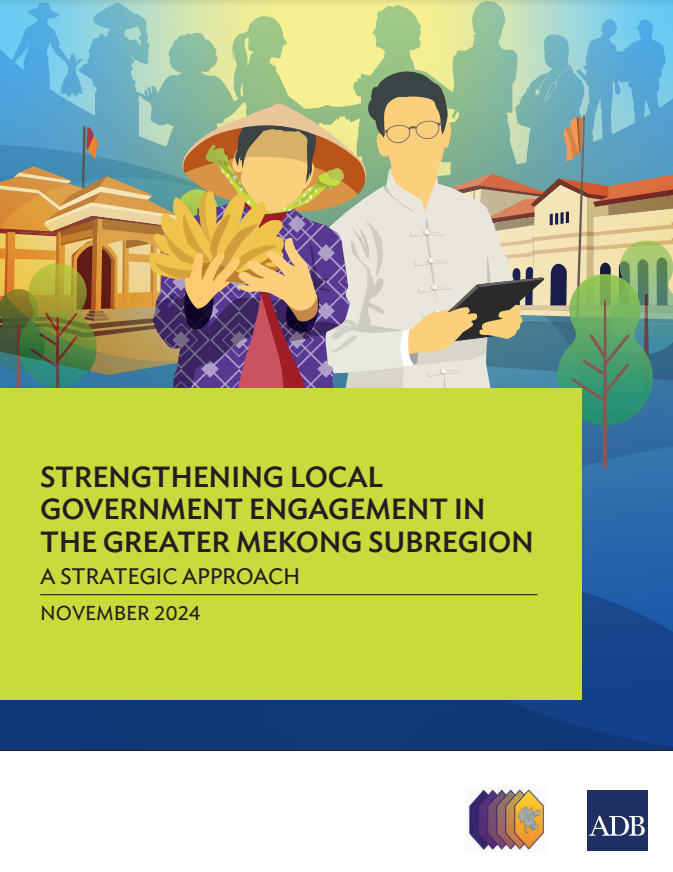
Strengthening Local Government Engagement in the Greater Mekong Subregion: A Strategic Approach
Outlining a strategy designed to boost local government participation in the Greater Mekong Subregion (GMS) Economic Cooperation program, this report presents practical implications and offers recommendations to help drive a more sustainable future.

GMS 2030 Strategic Framework for Accelerating Climate Action and Environmental Sustainability
The GMS 2030 Strategic Framework for Accelerating Climate Action and Environmental Sustainability aims to prioritize actions to accelerate implementation of selected GMS-wide interventions towards meeting the national and international commitments on climate resilience, greenhouse gas mitigation, biodiversity conservation, and environmental sustainability.

GMS Digitalization Action Plan (2025–2027)
This was developed based on the Scoping Study on Digitalization in the GMS, presented for notation in the 26th GMS Ministerial Conference, and a complement to the GMS Digital Economy Cooperation Initiative, which was developed and proposed by the People’s Republic of China and endorsed by the 25th GMS Ministerial Conference.

Regional Investment Framework 2025-2027
The Greater Mekong Subregion (GMS) Regional Investment Framework 2025–2027 (RIF 2027) is the subsequent 3-year rolling pipeline of projects of the GMS Program. It is comprised of 176 projects across the countries and sectors of the GMS program.

GMS Digitalization Action Plan (2025–2027)
This was developed based on the Scoping Study on Digitalization in the GMS, presented for notation in the 26th GMS Ministerial Conference, and a complement to the GMS Digital Economy Cooperation Initiative, which was developed and proposed by the People’s Republic of China and endorsed by the 25th GMS Ministerial Conference.

The Greater Mekong Subregion Program Strategy 2030: Results Framework
The GMS Secretariat, in close coordination with GMS countries, will prepare a results framework to trace the implementation of GMS-2030...

Report to the Leaders on Recent Achievements and Directions of GMS Cooperation
This document outlines the achievements of the GMS Program since the 7th GMS Summit. This report has three parts: I – The Work and Accomplishments of the GMS Program Since the Last Summit; II – The Various Deliverables for the 8th GMS Summit; and III – The Proposed Future Directions for the GMS Program.

Greater Mekong Subregion Infographics 2024
The latest GMS infographic gives a snapshot of progress in implementing the GMS Economic Cooperation Program Strategic Framework (GMS-2030).

GMS Regional Health Cooperation Strategy 2024-2030
The GMS Health Cooperation Strategy 2024-2030 builds upon the previous 2019-2023 strategy and two decades of development partner support, including the Asian Development Bank.

Scaling Up One Health Approaches in the Greater Mekong Subregion
The publication addresses the use of wildlife, underlines the need to ramp up action against diseases such as rabies, and shows why countries should build up their animal health capacities.

Harmonization of Sanitary and Phytosanitary Measures for Greater Mekong Subregion Countries
Pointing to rising trade between GMS countries and explaining the link between food security and global value chains, the brief shows how some exporters may initially be impacted by SPS measures due to adaptation costs.

Greater Mekong Subregion Gender Strategy Implementation Plan 2025-2030
This report shows how improving gender mainstreaming via the Greater Mekong Subregion Economic Cooperation Program Strategic Framework 2030 (GMS-2030) can bolster inclusivity and ensure women benefit equally from regional cooperation initiatives.

Strengthening Local Government Engagement in the Greater Mekong Subregion: A Strategic Approach
Outlining a strategy designed to boost local government participation in the Greater Mekong Subregion (GMS) Economic Cooperation program, this report presents practical implications and offers recommendations to help drive a more sustainable future.

GMS 2030 Strategic Framework for Accelerating Climate Action and Environmental Sustainability
The GMS 2030 Strategic Framework for Accelerating Climate Action and Environmental Sustainability aims to prioritize actions to accelerate implementation of selected GMS-wide interventions towards meeting the national and international commitments on climate resilience, greenhouse gas mitigation, biodiversity conservation, and environmental sustainability.

GMS Digitalization Action Plan (2025–2027)
This was developed based on the Scoping Study on Digitalization in the GMS, presented for notation in the 26th GMS Ministerial Conference, and a complement to the GMS Digital Economy Cooperation Initiative, which was developed and proposed by the People’s Republic of China and endorsed by the 25th GMS Ministerial Conference.
Latest News
Cambodia’s tourism sector breaks new ground, earns $3.63 billion
The Kingdom received 6.7 million international tourists last year, up 22.9 percent from 5.45 million in the year before, read the report.
Thailand Aims for 2030 Launch of Railway Link to PRC
The Government of Thailand has announced that its ambitious high-speed railway project connecting the country to the People’s Republic of China (PRC) through the Lao People’s Democratic Republic (Lao PDR) is scheduled to begin operations in 2030.
9th Joint Committee Meeting for the GMS Cross-Border Transport Agreement
The 9th GMS Cross-Border Transport Facilitation Agreement (CBTA) Joint Committee Meeting was held in Vientiane, Lao PDR, on 13 December 2024. GMS transport ministers and country representatives confirmed the recent movement of goods between the PRC and neighboring countries, under the “Early Harvest” Memorandum of Understanding that enables vehicles with permits to travel across the GMS. The Joint Committee meeting provided an opportunity to discuss the 2025 work plan.
Thailand’s tourism authority banking on 4 niche markets in 2025
The agency is developing new exclusive events for Thailand to accommodate the high-spending and luxury tourism trend.
Viet Nam and Laos discuss new partnerships to surge tourism
In a significant move to enhance their cultural and tourism cooperation, Viet Nam and Laos held a series of discussions this week to solidify their partnership. Vietnamese Deputy Minister of Culture, Sports, and Tourism Hoang Dao Cuong met with Lao officials, including Deputy Chief of the Lao People’s Revolutionary Party (LPRP) Central Committee Office Khampha Phimmasone, in Vientiane on December 10, 2024.
21st Working Group on Agriculture Annual Meeting (WGA-21) back-to-back with AMM-3
The 21st GMS Working Group on Agriculture (WGA-21), held on 21 November 2024, the third day of AMM-3, shared GMS country strategies and policies for enhancing agricultural sector transformation. The meeting showcased demonstrations, knowledge products, and outcomes from capacity building programs implemented under the GMS Sustainable Agriculture and Food Security Program (SAFSP).
6th Meeting and 3rd Training of the Task Force on Trade and Investment
The 3rd workshop and 6th meeting of the Greater Mekong Subregion Task Force on Trade and Investment (GMS TFTI) was held on 9-11 October 2024 in Hanoi, Viet Nam.
The Trial Run of the Early Harvest Implementation of GMS Cross-Border Transport Facilitation Agreement
The successful completion of the trial run under the 'Early Harvest' (EH) implementation of GMS Cross-Border Transport Facilitation Agreement (CBTA) from June 22-27, 2024, marked a historic milestone in GMS cooperation.
26th Meeting of Subregional Transport Forum (STF-26)
The successful completion of the trial run under the 'Early Harvest' (EH) implementation of GMS Cross-Border Transport Facilitation Agreement (CBTA) from June 22-27, 2024, marked a historic milestone in GMS cooperation. Since 2020, the coronavirus disease pandemic have caused various constraints on global supply chains and logistics, significantly affecting the supply of goods, their prices, and people’s livelihoods.
Phnom Penh Joint Statement on Prevention of Plastic Pollution in the Greater Mekong Subregion
n a milestone moment for GMS-wide environmental collaboration, the representatives of the GMS ministries of environment pledged to work together to address the mounting issue of plastic waste pollution in the subregion.
Second Mekong Dialogue on Labor Mobility Meeting Report
This dialogue was conducted within the framework of the Greater Mekong Subregion (GMS) Economic Cooperation Program and with the support of the Asian Development Bank (ADB) and the International Organization for Migration (IOM).


